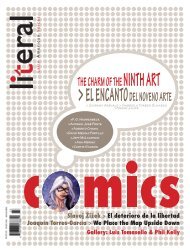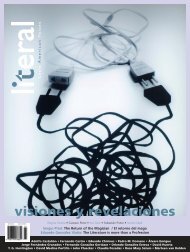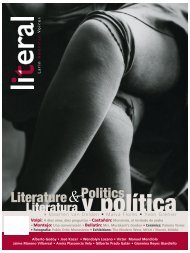Richard Serra - Literal
Richard Serra - Literal
Richard Serra - Literal
You also want an ePaper? Increase the reach of your titles
YUMPU automatically turns print PDFs into web optimized ePapers that Google loves.
a la de Harvard, ni nada por el estilo. Sin embargo,<br />
a Fox le da exactamente lo mismo que objeten o no<br />
porque, entre otras cosas, para él el libro es un objeto<br />
extraño que, como no tuvo lugar en su casa, no tuvo<br />
lugar en su imaginación. Se lanza así a algo despiadado<br />
en una zona de la ciudad que colinda con sectores<br />
absolutamente populares; con un presupuesto descomunal<br />
construyen una biblioteca que cuesta 2100 millones<br />
de pesos, lo cual es una cantidad desaforada. Se<br />
les olvida que está levantada sobre un manto freático,<br />
lo que va a dar por resultado una situación que para<br />
los libros es fatal. Luego construyen un jardín botánico<br />
que, con una generosidad que todavía me ruboriza,<br />
dicen que se va a ver bien dentro de cincuenta años.<br />
Este jardín también va a tener consecuencias dramáticas<br />
para los libros y luego tienen un acervo para esa<br />
megabiblioteca de trescientos mil libros, ninguno de<br />
los cuales se imprimió antes de 1980. Todo el proyecto<br />
es tan desaforado que me parece increíble, aunque la<br />
crítica no sirve para nada. Un problema de la crítica<br />
actual en el mundo entero es que da igual. La crítica<br />
ya forma parte del ruido lejano; la crítica no infl uye, no<br />
determina y, de tanto no determinar, se vuelve inaudible.<br />
Empiezan los problemas y, sobre todo, el año pasado<br />
se pierden treinta mil libros por el agua, se mojan<br />
irremediablemente pues los libros no están acostumbrados<br />
a nadar… Allí empieza el desastre hasta que<br />
recientemente tienen que cerrarla por otros numerosos<br />
problemas. Este proyecto está condenado desde el<br />
principio y yo creo que la humildad es lo que ya empieza<br />
a exigirse en proyectos culturales, ya pasó la era<br />
de la gigantomaquia pues sus proyectos no los permite<br />
ni la capacidad económica del estado, ni la necesidad<br />
de los ciudadanos que más que todo está centrada en<br />
ofertas al alcance.<br />
AB: Dentro de este panorama de la gigantomaquia<br />
ofi cial y su grandilocuencia, surgen alternativas culturales<br />
como el recién inaugurado museo del Estanquillo,<br />
donde se exhiben muchas de las colecciones personales<br />
de Carlos Monsiváis. ¿Qué importancia tienen iniciativas<br />
como ésta? ¿Podríamos decir que hay detrás<br />
de estos proyectos una política cultural de distinta índole?<br />
CM: Hay actualmente en México un espacio para<br />
museos alternativos que se está cumpliendo muy bien,<br />
pero esto se da fundamentalmente en la ciudad de<br />
México, con muy pocas excepciones de algunos lugares<br />
de la provincia. Habría que decir que este espacio<br />
alternativo tiene también algo que ver con la gigantomaquia<br />
a la que me refería anteriormente, pero de otra<br />
manera. El museo que nosotros intentamos (“El Estanquillo”),<br />
en cuya realización yo no tuve nada que ver,<br />
busca la recuperación de un pasado que está sustentado<br />
en el gusto, no en la historia, no en la sociología, y<br />
no en el deseo nacional. A mí me gustan los grabados<br />
del taller de la Gráfi ca Popular, me gustan los cómics,<br />
22 4 L ITERAL. LATIN AMERICAN VOICES • FALL, 2007<br />
l<br />
ate a library like Harvard’s, or anything of the sort. Yet<br />
Fox couldn’t care less whether or not there are objections<br />
because, among other things, to him the book is<br />
an alien object that, having been denied place in his<br />
home, has no place in his imagination either. Therefore<br />
he relentlessly embarks on a library with a gargantuan<br />
budget of 2.1 billion pesos, a ridiculous sum, in a part<br />
of the city that borders on highly impoverished neighborhoods.<br />
Forgetting that it’s been built on a freatic<br />
layer, which is going to evolve into a situation lethal<br />
to books. Then they build a botanic garden that they<br />
say, with a generosity that still makes me blush, will be<br />
looking good within the next fi fty years. This garden<br />
will also have dramatic consequences for the books.<br />
And then they have a storage capacity for 300,000<br />
books in this megalibrary, none of which were printed<br />
before 1980. The entire project is so absurd that I fi nd<br />
it hard to believe, although criticism no longer does<br />
any good at all. The problem with criticism around the<br />
world today is that it doesn’t matter; criticism already<br />
blends into the background noise, criticism has no<br />
infl uence, it doesn’t determine anything and from so<br />
much non-determination, it becomes inaudible. That’s<br />
where the trouble begins. Overall last year, thirty thousand<br />
books were lost to water: they were damaged beyond<br />
repair, because books aren’t used to swimming...<br />
The disaster goes on from there until, recently, they<br />
had to close the mega-library due to other numerous<br />
problems. This project was doomed from the start. I<br />
think that from now on, what we need to demand<br />
from cultural projects is humility; the era of gigantomachia<br />
has passed, because these projects aren’t feasible<br />
either in terms of the State’s economic capacity, or the<br />
demands of citizens, which revolve mostly around projects<br />
that are within reach.<br />
AB: Within this panorama of offi cial gigantomachia<br />
and grandiloquence, cultural alternatives arise such as<br />
the recently inaugurated museum of El Estanquillo,<br />
which exhibits many of Carlos Monsiváis’s private collections.<br />
What is the importance of initiatives like this<br />
one? Might we say that a different kind of cultural<br />
policy is to be found behind these projects?<br />
CM: In Mexico today, there’s enough room for alternative<br />
museums, a space that is being fi lled nicely.<br />
But this is fundamentally true in Mexico City, with very<br />
few exceptions in some provincial locations. You’d have<br />
to say that this alternative space also has something to






